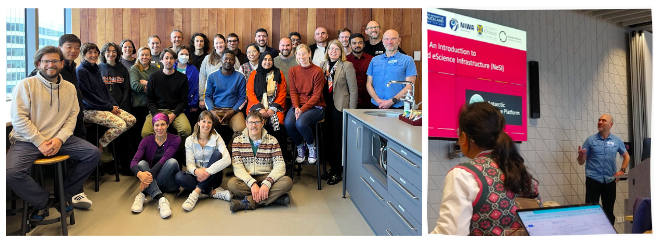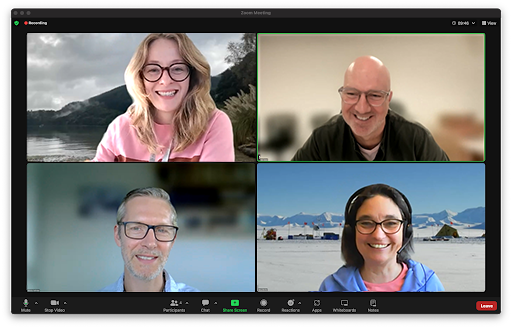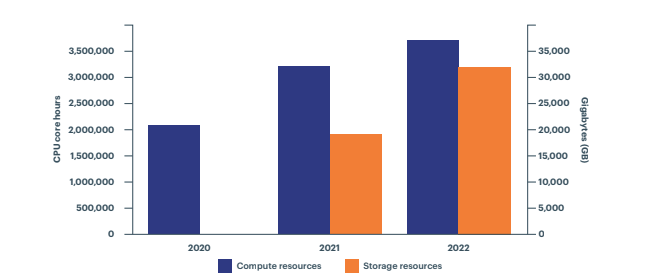Partnering to lift Aotearoa's science capabilities to tackle climate change challenges
When Cyclone Gabrielle blew through Aotearoa in February 2023, it unleashed unprecedented rainfall, triggered widespread flooding and landslip events, and caused significant damage to homes and infrastructure across northern and eastern regions of the North Island.
With many affected areas, businesses and individuals still recovering from Cyclone Gabrielle's effects, it was a timely real-world example to incorporate into the Antarctic Science Platform's (ASP) 2023 Winter School in September.
Organised and run by the Antarctic Science Platform's National Modelling Hub in collaboration with NeSI, the workshop hosted more than 20 participants from New Zealand universities and Crown Research Institutes (CRIs).
They gathered at Te Herenga Waka — Victoria University of Wellington to learn about climate models, numerical modelling, and data analysis, and even ran their own simulations of Cyclone Gabrielle.
NeSI staff were on hand for all three days helping teach and supervise the interactive sessions together with National Modelling Hub researchers. In addition to equipping participants with the skills they need to achieve their research and career goals, using Cyclone Gabrielle as a use case for their exercises reinforced how climate research is meaningful to the everyday lives of New Zealanders.

Collaborative training events like the Winter School are just one of the ways NeSI and ASP are partnering to build shared understanding and insights to support a healthy and high performing research ecosystem in Aotearoa.
A Memorandum of Understanding signed by both organisations in 2020 was renewed this year, with NeSI and ASP re-committing to work together in building capabilities across New Zealand's Antarctic research community, and in support of Government research priorities.
“Strong partnerships with key national research programmes are the essence of how NeSI shapes our support for researchers and national priorities,” said Nick Jones, NeSI Director. “Our cooperative approach with the Antarctic research community - through joint workshops, computational skills training, or supporting advanced modelling and data workflows - bring our experts alongside each other. We’re always ready to help with the complex computational challenges underpinning their research into the evolution of the Antarctic, its ice sheets, and the surrounding oceans, all linked to evolution in global and regional climate.”

The MOU focuses on the advanced computational and data science capabilities and needs of ASP, and on identifying how these are supported within the current or future scope of NeSI’s services, expertise, infrastructure, and skills.
Together we'll work cooperatively and collaboratively to discover and learn about opportunities, gaps, challenges, and investments across the range of projects being carried out by the ASP researchers and by NeSI’s team.
Since 2020, NeSI's high performance computing (HPC) platform has powered projects for ASP's National Modelling Hub, enabling Hub researchers to create improved forecasts and develop new tools that support different models (such as ice sheet, ocean, atmosphere or sea ice models) interacting and informing each other.
ASP use of compute and data resources on the NeSI HPC Platform (2020-2022)

NeSI's HPC Platform supports ASP's parallelised numerical ice sheet models and Hub researchers building, compiling and running complex and data-intensive simulations. Many of ASP researchers have also tapped into NeSI's Consultancy service, enabling them to improve the workflow, efficiency, and performance of their models.
So far in 2023, ASP has run nine different projects on NeSI platforms, ranging in focus from developing a regional-scale climate model for the Ross sea domain, to building a model that quantifies the Ross Ice shelf cavity meltrate and how it may change in the future.
With New Zealand sea ice scientists calling for urgent emissions reduction following record low sea ice levels in Antarctica this year, partnerships like the MOU between NeSI and ASP are critical to Aotearoa's ability to better understand and respond to the climate change challenges of today and the future.
Examples of ASP projects using NeSI resources:
- Improving research approaches to predicting sea level rise
- Understanding the impacts of future warming in the Antarctic
- Searching for new insights into atmospheric processes and interactions





